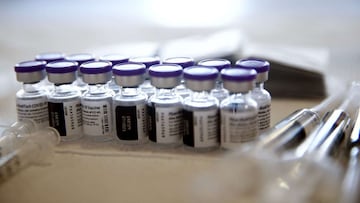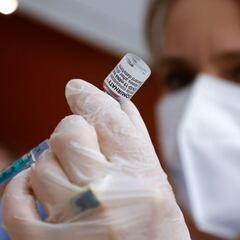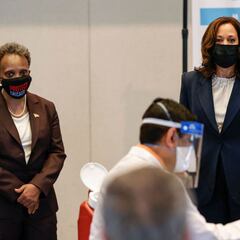When are you fully vaccinated from Covid: which vaccines require two doses?
There are currently three vaccines being administered in the US, those developed by Pfizer, Moderna and Johnson and Johnson.

The United States vaccination drive is in full swing. More than 187 million doses have been administered in the United States, with 70 million people, or 21.5% of the total population, fully vaccinated. One third of the US population has now received at least one dose of the covid-19 vaccine.
"Our progress on vaccinations is proof that there’s nothing America can’t achieve when we do it together,” said Joe Biden following the publication of the latest vaccination report. His comments came after 4.6 million doses of the covid-19 vaccine were administered on Friday, 9 April, setting a new single-day record.
Estimations are that 500 million Americans will be fully vaccinated by the end of August/early September, with President Joe Biden previously suggesting that the US would be "approaching normalcy by the end of this year."
Our progress on vaccinations is proof that there’s nothing America can’t achieve when we do it together. pic.twitter.com/51fKUzciVJ
— President Biden (@POTUS) April 11, 2021
Vaccines: Moderna and Pfizer require two shots
There are currently three vaccines being administered in the US, those developed by Pfizer, Moderna and Johnson and Johnson.
Pfizer-BioNTech and Moderna were the first two pharmaceutical companies to get their vaccines approved by the Food and Drug Administration back in November. Both of these vaccinations require two doses to reach full efficacy, the main dose followed by a booster shot.
- Fastest US states to administer covid-19 vaccines
- How long does the Moderna vaccine last?
- When 90% of US adult population will be eligible for covid-19 vaccine, according to Biden
The recommended interval between doses is 21 days for Pfizer-BioNTech and 28 days for Moderna. However, if a delay is unavoidable, 42 days between doses is the CDC's recommended maximum limit.
Both the Pfizer and Moderna vaccines are based on novel messenger RNA (mRNA) technology, boasting efficacy rates of 95% and 94.1%, respectively. They are the first-ever mRNA vaccines to be approved by the FDA.
Yes, the Johnson & Johnson vaccine has lower reported efficacy than Moderna and Pfizer’s.
— Vox (@voxdotcom) March 23, 2021
But in clinical trials, it was 100% effective at preventing hospitalizations and deaths. And experts say its 66% disease prevention efficacy is still "superb." https://t.co/gENb3MZ6a0 pic.twitter.com/vdrEDMizHN
Johnson & Johnson provide one-shot solution
In late-February the FDA approved the covid-19 vaccination manufactured by Johnson & Johnson, which is the first one-dose shot to be granted authorization. The Johnson & Johnson vaccine is less effective than the two-shot alternatives, but is still around 85% effective at preventing severe and critical cases.
Related stories
Because it does not require a second shot the distribution and administration of the Johnson & Johnson vaccine should be far easier, but manufacturing issues has stalled the rollout. Distribution efforts have also been hampered after 15 million doses of the Johnson & Johnson vaccine were accidentally allowed to spoil at a production facility in Baltimore. As a result, Johnson & Johnson will allocate 86 percent fewer doses across the United States this week than are currently being allocated, according to CDC data.
So far only 5 million Johnson & Johnson shots have been administered, far behind the company’s initial target of 20 million doses by the end of March. In comparison, 170 million shots of the Pfizer-BioNTech and Moderna vaccines have so far been administered.

